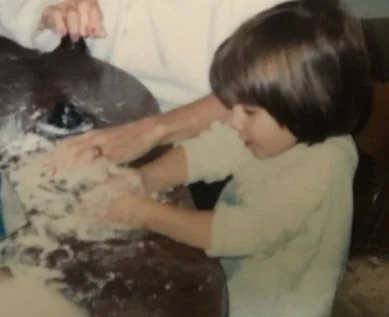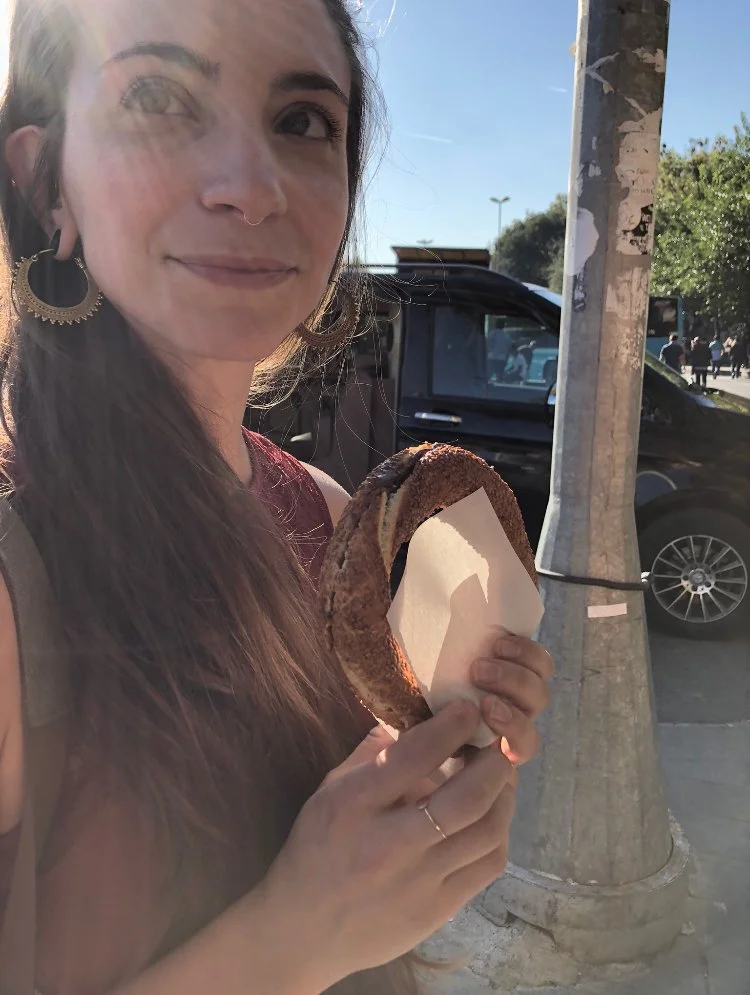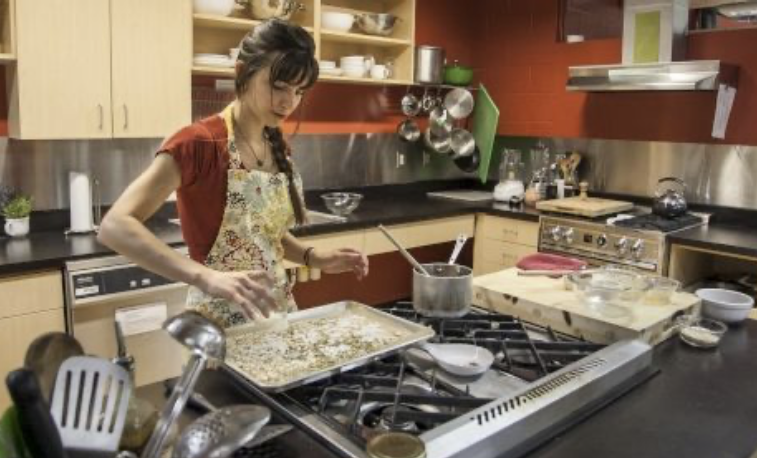
Hey, I’m Tina
RD/writer
Chef/human
The strongest sense of belonging I’ve ever felt was working in catering kitchens, though it wasn’t always serving me. It was easy to show up half present, depleted from the previous evening’s activities, recharge by glugging down a cold brew, and bang out a shift. Afterward, shift drink and maybe karaoke or other shenanigans with coworkers and other industry folk. Wash, rinse, repeat. The things we can get away with in our 20’s, amirite? This lifestyle was a predictable level of stress, predictable level of relief, and an endless array of tasty things. Then, life swept the kitchen mats right out from under my feet when a chronic illness suddenly consumed me.
At 26 years old, I learned that navigating our medical system with minimal resources feels like running blindfolded and barefoot through a dark room filled with mousetraps and LEGO pieces. At my sickest, the most help and humanity I received was from seeing Registered Dietitians (more on that another time). I’d already earned a Bachelor of Science in Nutrition and Culinary Arts, and this experience solidified my next steps toward becoming a RD myself.
In an unpredictable body, I maneuvered my way through a rigorous graduate program to earn a Master of Science in Nutrition, get accepted into a Dietetic Internship, and take the board exam to be credentialed as a Registered Dietitian. It took everything in me and a few times, I came close to falling apart completely. I couldn’t work, I could barely eat for days at a time. At my worst I ended up in the ER, but still made it to class the next day. I had no other options. Every ounce of my energy went toward learning Anatomy and Physiology, Biochemistry, Nutrient Metabolism, and digesting other classes that required learning long ribbons of Latin phrases, counseling concepts, and drew from a deep love of food, even though I could barely touch it.
Within the first year of being sick I saw 14 MDs, DOs, NPs, PAs, NDs, and acupuncturists. Appointments became a part-time job. I eliminated every food I could, I even drank celery juice in my desperation. I grieved my old life, I was bitter to have been torn away from my career in food, my hobbies, my friends. But I gained empathy, I learned how to listen, how to sit and process discomfort; skills that drive my nutrition practice.
Working as a Registered Dietitian, I refuse to pretend I’m some monk on a misty mountaintop sitting calmly with folded legs, holding esoteric answers like a basket of flower petals, ready to shower them on my patients for a hefty fee at each visit. My work in nutrition isn’t about me, it’s about the person in front of me, though I lean on my experiences to remember the depth of challenge that comes with health changes.
Simply put, I’m a human being in a body, too, trying just the same to understand and cope with the changes of life, while holding space, asking questions, sharing tools, and offering suggestions to give others the opportunity to do the just that. I’ve also been branching out, teaching classes and presentations on the body and managing diseases without wasting thousands of dollars or losing your damn mind in the meantime. To me, that’s nutrition.
Thanks for reading. Hope we’ll be in touch.

Culture, PrivileGe, approach
As a cis-gendered, thin-bodied white woman, I’m aware that my experiences are not that of us all.
I don’t feel it’s appropriate to pretend that a single set of nutrition recommendations applies to everyone. I also don’t feel it’s appropriate to pretend that everyone has to be a specific body size to be considered healthy. That’s the poisonous way of thinking that oppresses instead of uplifts.
Working with a RD should include unconditional regard for your intersectionality and lived experience. Nutrition recommendations that abruptly disconnect us from our roots or our aligned gender are harmful, even traumatic, and can leave us far worse off than where we started. I’m good with skipping past that business if you are.
The essays and classes I share are carefully assembled to consider impact over intention. If we work one-on-one, I won’t assume to be an expert on your culture or lived experience. Instead, I will apply my expertise in cooking and nutrition counseling to our work together, in full appreciation of your whole being.

Education.
Bastyr University - Seattle, WA, 2018-2019
- Completed 1,200 hours of supervised practice at Seattle-area hospitals, community clinics, long-term care facilities, and private practices
Dietetic Internship
Bastyr University - Seattle, WA, 2016-2018
- Completed ACEND-accredited coursework in medical nutrition therapy, nutrition counseling, advanced nutrient metabolism, and pathology, as well as supplements, herbal sciences, and Ayurvedic nutrition
- Gained 90 hours of experience as student clinician at Bastyr Center for Natural Health
- Fulfilled over 300 hours of clinical, community, and food service volunteering
Master of Science, Nutrition/DPD
Bastyr University - Seattle, WA, 2013-2015
- Completed coursework in biochemistry, nutrient metabolism, food science, culinary foundations, cooking demonstration, herbal sciences, foraging, and ecological nutrition
- Fulfilled 88-hour Culinary Internship in Seattle-area restaurants and culinary teaching institutions
Bachelor of Science, Nutrition & Culinary Arts
Associate of Arts, Liberal Arts
Community College of Allegheny County - Pittsburgh, PA, 2007-2011ish
- Completed coursework in English literature, creative writing, ceramics, drawing, human biology, and general chemistry
- Frequently skipped classes to roam the North Side, read and write in parks, and meet up with friends to drink too much coffee and smoke too many cigarettes
Featured in
Featured in









